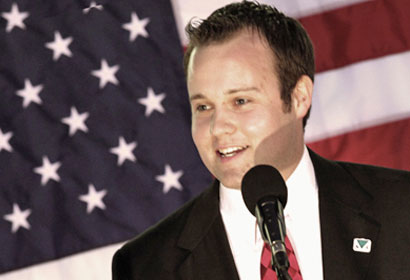Kevin Roose, author of the new book “The Unlikely Disciple: A Sinner’s Semester at America’s Holiest University” about his time at Jerry Falwell’s Liberty University, has a new piece up in Esquire explaining that there are two types of classes at the school:
I’m finding that my favorite courses, like Old Testament and Theology, have something in common: they’re surveys, classes in which the professor’s goal is simply to introduce a body of new information. The information always has a literalist slant, of course, but on the whole, the classes are fairly straightforward. You’d find the same thing at a hundred other Christian colleges and Bible study groups. There’s another type of class, though — the agenda-driven class. In these courses, professors aren’t teaching new knowledge so much as teaching students how to think about the world around them.
The second type of classes, known as General Description of the Contemporary Issues or GNED, are designed to “establish undergraduate students in the Christian worldview, and to equip them to apply it through a biblically centered decision making process in relation to various contemporary issues.”
Roose provides some insight into what such classes entail:
A week or two before spring break, I started sitting in on GNED II, a mandatory second-semester extension of my GNED course. I’m only at Liberty for one semester, so I’ll never get to take GNED II for a grade, but people on my hall kept talking about it, and I wanted to get the flavor. The GNED II class I’ve been going to, like my GNED I class, is taught by Dr. Parks. In it, Liberty students are taught to view sociopolitical topics like homosexuality, abortion, and euthanasia through an ultraconservative Christian lens. And unlike its first-semester counterpart, GNED II pulls no punches. Its workbook contains fill-in-the blank sections like:


In today’s GNED II class, Dr. Parks announces that we will be talking about gender roles in the evangelical world. Dr. Parks spends the first ten minutes of class laying out the two main positions evangelical Christians take on gender issues. The first position, egalitarianism, means exactly what you’d expect it to mean — men and women are equal, both in the church and in the home. Women can be pastors of a church, they can teach Sunday school, and husbands and wives share equal authority in marriage. The second position, called complementarianism, means, in Dr. Parks’s words, that “God created man and woman with different roles that complement each other.” Complementarians believe that only men can be pastors, that only men can teach Sunday school or other Christian education classes (unless it’s an all-female class). Complementarians also maintain that the husband should be the head of the household. They quote Ephesians 5:24, “As the church submits to Christ, so also wives should submit to their husbands in everything (NIV).”
“You can obviously tell where I am on this,” Dr. Parks says. “I am definitely a complementarian, without apology. I think the egalitarian view is greatly skewed.”
Dr. Parks clicks a few buttons on his laptop to start a PowerPoint slideshow. The text is accompanied by photos of white, midthirties couples clutching each other, loving gazes plastered on their faces. As the presentation plays, we fill in the blanks in our workbooks:

Dr. Parks realizes that to a nonevangelical, the complementarian view of gender roles can sound misogynistic, but he assures us that it’s not. Women can still hold high-power jobs under the complementarian model, he says, and they should still get equal pay for equal work. But when push comes to shove, a woman’s priority should be her family. “For a woman,” Dr. Parks says, “if the career is most important, and the family gets left out, that’s a problem.”
As Roose says, these classes are the types of class “a liberal secularist would invent if he were trying to satirize a Liberty education. It’s as if Brown offered a course called Secular Hedonism 101: How to Smoke Pot, Cross-dress, and Lose Your Morals. But unlike that course, GNED II actually exists.”







